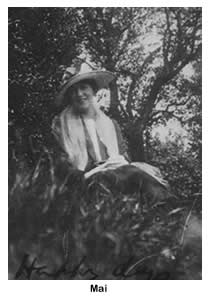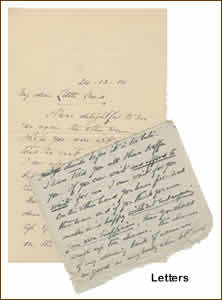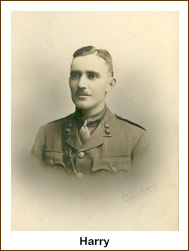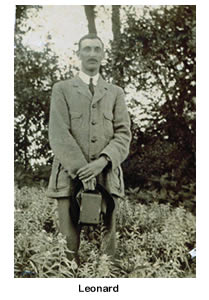In the drawer was the bundle of letters. They had been there all of my life and many decades before, but should I read them now she was gone? Well, I expect you can guess!

As a child I lived in an all-female environment. My mother was widowed and we lived with my spinster aunt and my grandmother. I remember the first time I brought a boyfriend home to meet my family. My grandmother was 90 at the time, blind and very frail, but when this young man walked through the door, it was like flicking a switch! A flirt at 90?! At the time I was highly embarrassed, but I now realise that she had just gone back to her youth; she had come alive. This was how she had been all those years ago; it was like getting a snapshot of something from a former time, just for a few moments.
Mai had been the archetypal difficult teenager; “As long as Mai is happy” was the resounding cry from her worn out parents.In her middle class Edwardian world she wanted fun, parties, excitement, a job and marriage to a dashing man with prospects. As she was beautiful, well educated and well read, she probably thought that she was entitled to it all! But in August 1914, when Mai was 21, the First World War began and changed her life forever.
At first things were exciting. She had more freedom and her work was interesting, taking her into the city everyday. Her social circle expanded, and amongst her new friends was Harry.
Harry was a Captain in the Royal Scots Fusiliers and in civilian life he had been a solicitor. Mai’s family would have known Harry’s parents and siblings as they lived quite close to each other. I’m sure he was considered by all as an eminently suitable potential marriage partner for Mai; though he was perhaps not particularly dashing or exciting, he was safe, well off, trustworthy and honourable.
Mai’s relationship with Harry began at Christmas 1914, when he bought a Christmas gift for “My Little Friend”. At first Mai played hard to get! On two occasions during January 1915 Harry made the train journey to Twickenham, firstly from barracks at Alresford, and later from Aldershot, Hampshire. Each time he only had a pass for a few hours, yet each time she failed to meet him at the agreed place. He kindly accepted the excuse of toothache and the letters continued, sometimes more than one a day. I don’t know what Mai wrote in hers, but it would seem that she complained at his “lack of attention” and there were endless apologies in his replies. He talks much of his life in the army, explaining how busy he is and how many hours are spent in training. It is very obvious that he feels a high level of responsibility towards the men he will be leading once his training is over.
At the start of February Mai announces that she may go to live in Australia! Was this to test Harry’s reaction? His reply says that she should not consider him in the decision she makes, as he will soon be “on the continent, with a sea of possibilities” and his life “will be in the lap of the Gods”. He asks if he can have her photograph as a memento

The next few letters concern arrangements to meet again on 24th February at Ascot. It would seem that they shall be going to a party. The first letter after the party, written 25th February, is completely different to those sent before. He writes of her sweet voice and her fragrance lingering on his scarf and concludes, “My dear little maid, I am longing to see you again. My dear Love – Goodnight, Yours Harry”. All previous letters were far more formal, so maybe he has taken a step forward, in his mind at least, as to where this relationship is going.
Nearly a week passes and on 1st March, Harry writes asking where the promised letters and photographs are. Why has she not contacted him? He reminds her that it is his 27th birthday and “with the way things are” could be his last and he is saddened that he hasn’t heard from her.
On 31st March Harry, who had Scots grandparents, writes, “Where are you going to in the north; the dear Scotland that I love so well? What is at the bottom of it all, your letter is cold in its tone. Have you received my last two letters? Your illness must have been very serious. I should like to know.” He cannot get any leave and it may be that he will be going to France before he can see her again.
12th April 1915 – Harry reverts to addressing Mai as “Little friend”, having begun the last few letters “My Dearest Maisie”; “You told me one evening in Hyde Park that you could not marry a man you did not love, so I assume you are following your true instincts. On the other hand, are your actions ill-considered?” He says that he will not write again and “I understand that all you have written to me goes for nothing? I will destroy or return your letters. I have sent you the photograph, though why you should want it? Forget me, but for God’s sake do not make a hash of your life when you are getting a chance. I had better not write any more. Goodbye to dreams that have been woven around your future, Yours ever, Harry”
1st May 1915 – “Since you have made up your mind to marry this man you must blot me out of your life and find your happiness. If you don’t do so and if you are not going to do so, you had better not marry him. I quite realise that you have told him everything, but it is you I am thinking of”.
6th June 1915 – “Why are you writing to me again? Have you broken your engagement? Your motives are mysterious. I must hear the whole story from beginning to end and exactly what is going on now”. He had just received the order to go to France and would be there within 48 hours.
21st Sept 1915 (Written from France) – He believes she has married and addresses this letter accordingly. He is much blunter than before, mentioning that she has had his personality all wrong and that he sees many things in a different light having seen the things he has seen in France.
25th Sept 1915 (Written from Bramshott camp, Hampshire) – He now understands that she is not married.
“It grieves me dreadfully to see you so distressed in mind. As to my taking you away, if I could I would, but I cannot. Firstly, because I cannot get leave to do so and secondly, because this is not a dream world, unfortunately for us. I do not want to write in what may appear to be an unsympathetic way, but facts must be faced. And they are these: You have consented to take this man as your husband and that being so you must go through with it unless you find your acceptance was premature and ill-considered.
Under the circumstances it is not open to me in honour to write to you in other than matter of fact terms and would not save your mind. My position is this, I have no means of my own beyond my pay at present and if we married it would mean a dependency. If I was knocked out there would be a small pension, that is all, for you and what would be your position then?

It is a wrong thing to sacrifice your own happiness and possibly your husband’s and you must decide before it is too late. I have told you all I have to offer you. If you can wait for me I can wait for you. On the other hand you have promised this man and if you think you can make him happy without endangering your own happiness, then you should weigh up the chances; the chances of my coming back of course are as good as anybody else’s, but anyone’s chance is not a good one. You must not give way to morbid thoughts; you have your life before you, you must make the best of it and govern your ways wisely.
Do not be hurt at my writing in what seems a detached way – regard myself on the eve of a desperate undertaking and as such not entitled to ask anything of anyone which might prejudice them without being able to make it good to them.
This letter is meant to be one of assistance to you so forgive its hard tone. I hope you may be easier.
Your friend, Harry”
Later the same day Harry found himself on the way back to the front line. Two days after that, on 27th September 1915, he was killed leading his men at Fosse Alley, Loos in Northern France. His body was never recovered and his life is commemorated on the Loos Memorial, however, at the time it was believed that there was a chance that he had been taken prisoner by the German army.
I feel that the last few months of Harry’s personal life must have been so frustrating for him. He went to his death still not knowing exactly what Mai wanted to do or what she had already done.
So, what had Mai been up to during the previous few months? The answer is that she had met Leonard.
Leonard was also a Captain, serving in the East Lancashire Regiment. He was 35 and had been brought up in India, where his father was an auditor for the army, but had returned to the UK at the start of the war. I have no idea when or where he first met Mai, but suspect that it was around the same time as she began corresponding with Harry.
Throughout March 1915 Harry had heard little from Mai, except for a letter to say that she had been very ill and that she was going up north, but she didn’t say where.
I believe that the ‘illness’ was probably a suspected, or an all too real, pregnancy. I cannot think of any other reason which would lead to the following series of ill thought out actions. The place where she was going to was not Scotland, but Preston, Lancashire, where Leonard was stationed at the Fulwood Barracks. I don’t know if Mai went to Preston in March, but in April Leonard was in Teignmouth, Devon where he visited Messrs Hill and Co, watchmakers and jewellers and took on approval two diamond rings to the value £21.13.0. The rings were neither paid for nor returned to the shop.
By 21st May 1915 Mai had found her way up north, as she married Leonard at the parish church of St John in Preston, Lancashire. Later the same day Leonard left with his regiment for France.
On 6th June Harry responded to a letter and asked “Why are you writing to me again? Have you broken your engagement? Your motives are mysterious”. If Mai had been pregnant, I wonder if by this time she wasn’t, but she was married and perhaps already regretting it? She had certainly married in haste, but seemed to be repenting in haste also!
At the end of May the army discovered a discrepancy in their accounts of £25. An army cheque had been drawn by Leonard, who had access to the cheque book, and cashed on 14th May. Further investigation revealed a total amount outstanding of £181.7.9. The army then recalled Leonard from France in order to question him, but when he returned he had been injured and so was admitted to St Thomas’ Hospital in London. The jeweller at Teignmouth had been scanning the newspapers on a daily basis for information regarding the Captain who had taken the diamond rings. Once he knew that his man had been injured, he made enquires and served a writ on Leonard at the hospital. Unfortunately the Captain denied his identity. The jeweller then travelled to London and personally served him with the writ, at which Leonard made a verbal promise of payment which was never kept.
On 22nd October the Captain was discharged from hospital and ordered to rejoin his regiment, but he failed to do so.
Where was Mai at this time? I have a letter sent by her father in November 1915 to the address of her close female friend, with whom she was staying in Teignmouth! The letter commiserates with her about “what that man has done to you”. However, he indicates that he believes that the nature of “what the man has done” to be breaking an engagement rather than deserting a wife. He also sent newspaper cuttings noting the possibility that Harry might be a prisoner of war, though he doesn’t imply that Harry was ever anything more than a friend to Mai.

Soon after this, Leonard was gazetted, lost his commission and was removed from the army lists for being absent without leave. Also, the police were trying to establish his whereabouts in connection with the outstanding debt to the army. In the course of their enquiries they were contacted by Messrs Dixon and Son, jewellers, of 384 Oxford Street, London. The story was very similar to that told by the Teignmouth jeweller; they had been approached by the Captain on 1st August 1914 and had lent him, on approval, two diamond rings to the value of £28.5.0. He had given his address as 8 Upper Montague St, West London. The jewellers had contacted the address and discovered this to be the home of Leonard’s wife and her parents. However, this wife was not Mai! Apparently, Leonard’s wife explained that they no longer lived together and she didn’t know of his whereabouts. Unbelievably, the police didn’t seem to realise that this lady who was Leonard’s wife in 1914 was not the same woman who they had recently contacted about Leonard. She was in fact Eva, who Leonard had married in 1906 and with whom he had three children. In the same paragraph that detailed the fraud at Oxford Street, the police report states that Leonard’s wife “is now residing at” my grandmother’s family home, and still has no knowledge of her husband. Of course etiquette demanded that her first name was (or their first names were) never mentioned in the reports, which presumably led to this misunderstanding.
Eventually Leonard was arrested by the police following a report that his wife (I don’t know which one, of course) had seen him boarding a train at Victoria station, on his way to Worthing where his parents lived.
On 7th March 1916 Leonard was sentenced at the Central Criminal Court to twelve months hard labour for forging and uttering an army cheque for £25. He was sent to Wormwood Scrubbs prison.
He was not to remain there long though. Just three days later, Leonard’s mother sent a letter to the Minister of War asking to petition His Majesty the King to allow her son to be released. She wrote a glowing, though not strictly accurate, report of his character and behaviour, suggesting that her son must have fallen into bad company as “he was of exemplary conduct until his mind was upset following fighting and being injured whist serving His Majesty and his country in Gallipoli”. Of course, all of his crimes already written about were committed before he was on active service.
The army were becoming short of men at this time, so eventually they relented and Leonard was released from prison back into the army. He was given a false name and the rank of private in the Argyll and Sutherland Highlanders.
Did Mai know about this? Somehow I doubt it. The army would not have wanted it made too public that an officer had gone to prison for fraud and had then been released with a false name. Did Mai know that Leonard was a bigamist? As the police never seemed to have realised that there were two wives helping them with their enquiries, it seems unlikely that Mai would have found out his true marital status. She certainly doesn’t seem to have informed her parents of her marriage. It would be true to Mai’s character to sweep the whole sorry saga under the carpet and pretend it never happened, but without thinking of any future consequences of these actions.
All of the drama with Leonard might have partially masked Mai’s thoughts and feelings when she heard that Harry was possibly a prisoner of war. However, in May 1916 Mai received a reply from the British Red Cross following an enquiry that she had made about Harry. They stated that they could not confirm whether he was a prisoner or had lost his life, though the tone of the letter is not hopeful.
I wonder if Mai kept her hopes for Harry alive? Certainly Harry’s mother never accepted his death. He was officially reported killed in action in February 1920, but his mother posted notices in The Times, asking for information on his whereabouts, for more than ten years.
Did Mai think much about Leonard, who she may well have thought was her legal husband? Did she ever wonder what happened to him, or did she dismiss him from her mind as best she could?
One day in August 1916, Mai was waiting for a train and saw a man with both his arms in slings. She always said to me that she first saw him from behind, but that she knew he would have a good looking face when he turned and he did! The man was my grandfather, who had been wounded at the Somme in July that year. Did she think of Leonard or of Harry as she made herself noticed to this man?
Did she think of them when the wounded man took her for a coffee as the train was delayed? Did she think of Leonard on her wedding day when she knocked four years from her age and called herself a spinster? Did she worry about possibly seeing or hearing from Leonard over the years? If only she had known; when she married my grandfather, Leonard was dead. He paid dearly for the crimes he had committed. His mother’s letter may have got him out of jail, but going back to the army led directly to his death as he was killed, still using his assumed name, in August 1917, just two months before my grandparents’ wedding. His body was not found and his assumed name is recorded on the Tyne Cot memorial in Belgium.
Maybe I am wrong and Mai knew far more than I imagine, but she was so secretive about her past. What was she trying to hide? If she had known Leonard was a bigamist she could have had that marriage annulled. Maybe when I imagine her feeling guilty, as in her mind she might have committed bigamy herself, perhaps she was actually feeling sad and thinking of Harry. Surely she must have wished that she had never set eyes on Leonard and if Harry had come home that she would have had a comfortable life as the wife of a solicitor. Instead she had an unhappy life as the wife of a man to whom she was completely unsuited.
I remember Armistice Day each year when I was a child. My gran would wear a brooch from the Royal Scots Fusiliers and cry all day. I suppose she was thinking of what she had lost. I wonder if she also thought of Leonard and if she did, what did she think?
Merry Monty Montgomery
© Merry Monty Montgomery 2008
